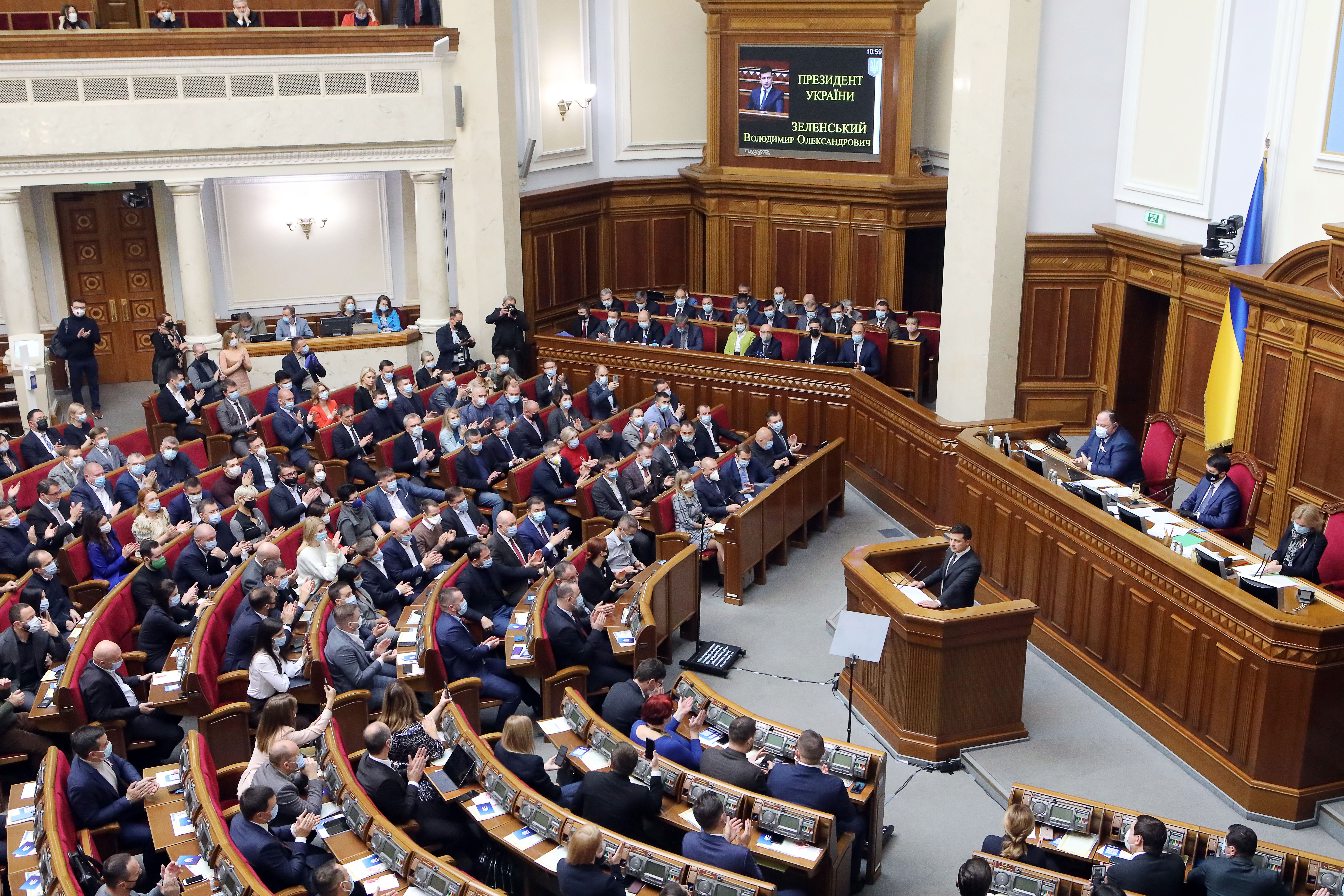A Never-Ending Story: The Fight Against Corruption in Ukraine

New Anti-Corruption Strategy
To coordinate the fight against corruption, the Ukrainian government adopted on 16 September an anti-corruption strategy for 2020–2024. While the previous document for 2014–2017 was focused on building independent institutions for the fight against corruption, the new strategy sets as its objective protecting their independence and eliminating corruption-generating factors. The new strategy identifies the greatest systemic loopholes encouraging corruption, means of eliminating them, and the entities responsible for this. The document places particular emphasis on reforming the judiciary, which is considered to be the most corrupt among the domestic institutions, eliminating corruption-generating legislation (e.g., by simplifying procedures), digitalisation (tenders, checking asset declarations), and ensuring criminal liability for corruption. The new anti-corruption strategy correctly defines the most important actions necessary to reduce corruption, but its implementation will be difficult to achieve due to the obstacles arising from the CCU’s rulings and the resistance of a large part of the political elite.
Ukraine’s Anti-Corruption System
The construction of an independent anti-corruption system in Ukraine began in 2014. It consists of four levels: monitoring, investigation, prosecution, and the judiciary. The National Agency on Corruption Prevention (NAZK) checks the asset declarations of politicians, officials, and local government authorities, verifies whether their lifestyle spending corresponds to official earnings and checks the finances of political parties. The National Anti-Corruption Bureau of Ukraine (NABU) gathers evidence in large-scale corruption cases while other cases are handled by the police or the National Bureau of Investigation. The Specialised Anti-Corruption Prosecutor's Office (SAP) is an independent unit of the Prosecutor General’s Office, which formulates indictments based on material collected by the NABU. The High Anti-Corruption Court is a specialised court headed by judges selected with the help of international experts.
After President Zelensky came to power, the anti-corruption system was further strengthened. More competences were given to NAZK and the control of property declarations was partially digitised. NABU was also granted the right to use wiretapping. Moreover, the Verkhovna Rada passed a law providing protection and rewards for whistleblowers. Despite efforts to reduce corruption, the scale of this phenomenon has increased in recent years. In a survey for the EU Anti-Corruption Initiative in 2020, 24% of respondents indicated that they have been asked for a bribe at least once in the last year (an increase of almost 2 p.p. compared to 2017). As many as 58% of Ukrainians negatively assessed the fight against corruption in the first year of the Zelensky presidency (in a survey by the Rating Group in May). The most corrupt institutions include the border service and courts.
Challenges and Problems of Anti-Corruption Policy
The lack of success in the fight against corruption is caused primarily by the fact that a large part of the Ukrainian political elite—including members of the ruling party—is trying to sabotage the work of anti-corruption institutions. They do not want to limit the opportunities for additional financial benefits and are afraid of being held responsible for corruption. Some MPs also act in the interests of oligarchs. The CCU has been used to paralyse the work of anti-corruption institutions, including three rulings issued by the court between 28 August and 27 October that made it practically impossible to bring those accused of corruption to justice, resulting in a political crisis. The CCU called into question the election of the head of NABU, repealed several regulations on this agency, and removed criminal liability for false asset declarations, and also paralysed the activities of NAZK. Among those petitioning the CCU on these matters were members of the pro-Russia Opposition Platform–For Life and members of the Servants of the People party associated with the oligarch Igor Kolomoisky. The CCU rulings on these matters exceeded the content of the motions and did not always lay out its reasoning for the decisions. There is a suspicion that CCU judges have also been acting on self-interest since several of them are subject to corruption investigations by NABU. In response, the president has submitted a draft law declaring the CCU’s ruling on NAZK of 27 October to be devoid of legal force and revoking the whole composition of the court. However, changing the composition by means of simple law is contrary to the Ukrainian constitution. For this reason, the head of the president's office, Andriy Yermak, has engaged in talks with the G7 countries to explain to them the motives for action. On the other hand, the Ukrainian opposition has expressed its disagreement, believing that the president is trying to usurp power.
At the same time, the Ukrainian authorities are seeking to limit the independence of anti-corruption institutions in favour of the president’s appointed Prosecutor General, Iryna Venediktova. She has been putting pressure on the heads of NABU and SAP, trying to take control over certain corruption cases. As a result of this pressure, the SAP chief resigned on 21 August. Subsequently, the Verkhovna Rada—with the votes of Servant of the People MPs—approved members of a committee to appoint a new SAP head who did not meet the formal requirements in part because of suspicions of corruption. This would make possible the appointment of a person dependent on the president. The work of anti-corruption institutions is also being sabotaged directly by some Servant of the People MPs. In March this year, they submitted a draft law to facilitate the dismissal of the head of NABU and, at the end of August, a second draft law reducing the powers and independence of NABU and SAP in favour of the Prosecutor General’s Office, which would have the right to control selected cases.
The attempts to limit the independence of anti-corruption institutions are violating the conditions of financial support to Ukraine from the IMF. The director of the IMF’s Communications Department, Gerry Rice, announced on 10 September that this was the reason for postponing the visit of the IMF mission to Ukraine and therefore also for the payment of another tranche of $1.4 billion. In turn, the World Bank and the EU are making their support conditional on cooperation with the IMF. The EU High Representative of the Union for Foreign Affairs and Security Policy announced on 22 September that Ukraine risks a suspension of financial assistance and the visa-free regime. Following the CCU judgment on NAZK, the EU again called on Ukraine to restore the effectiveness of its anti-corruption system.
Another unresolved problem is that the Security Service of Ukraine (SBU) has the power to investigate economic crimes. SBU officers have often been at the centre of corruption scandals, and their lifestyle spending has indicated they have access to income exceeding official earnings (as shown by NAZK). The SBU also abuses its powers to exert pressure on business, and previously even informed suspects of corruption about ongoing NABU investigations against them (e.g., about wiretapping). Both the EU and NATO insist on reform of the SBU, however the agency is headed by President Zelensky’s long-time friend Ivan Bakanov, who is capable of effectively sabotaging the reform.
Conclusions and Recommendations
For the fight against corruption in Ukraine to be successful, it is essential to maintain IMF and EU policies making financial support and visa-free travel conditional on the independence of anti-corruption institutions. The EU should insist on the adoption of a new law restoring the powers taken from NAZK by the CCU as well as the regulation of the legal status of NABU as soon as possible. However, the expectation is that for now anti-corruption reform will continue to be sabotaged by the CCU, against which external pressure is ineffective. It is, therefore, necessary to reform the CCU while ensuring the transparency of the procedures for appointing judges to the panel.
The issue of combating corruption in Ukraine is tied to the scale of smuggling on the Polish-Ukrainian border, the operations of Polish companies in Ukraine, and the conditions for the privatisation of Ukrainian companies. Poland may strive to maintain the independence of Ukrainian anti-corruption institutions and continue reforms supported by the EU and NATO, especially the reform of the SBU. It can also continue the cooperation and exchange of experience between the Polish Central Anti-Corruption Bureau (CBA) and NABU.


